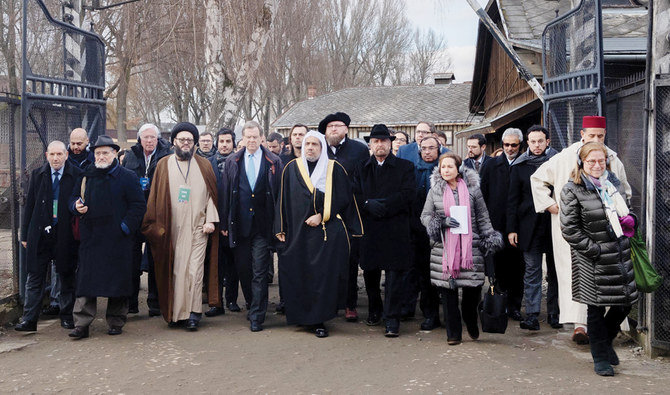KRAKOW: Muslim World League (MWL) Secretary-General Dr. Mohammed bin Abdulkarim Al-Issa and American Jewish Committee (AJC) CEO David Harris led a ground-breaking visit of Muslim and Jewish delegations to Auschwitz, the infamous Nazi death camp.
Al-Issa, who is based in Makkah, led a delegation of 62 Muslims, including 25 prominent religious leaders, from 28 countries.
According to a press statement, the mission is the most senior Islamic leadership delegation to ever visit any Nazi death camp.
The mission to Auschwitz is a key element of the memorandum of understanding between the AJC and MWL, which was signed by Al-Issa and Harris at the AJC headquarters in New York on April 30, 2019.
The visit occurred just ahead of International Holocaust Remembrance Day, which this year will mark the 75th anniversary of the liberation of the Nazi camp.
More than 1 million Jews were exterminated at Auschwitz, as well as over 100,000 non-Jewish inmates, among them principally Polish Catholics, Roma and Soviet prisoners of war.
“To be here, among the children of Holocaust survivors and members of the Jewish and Islamic communities, is both a sacred duty and a profound honor,” said Al-Issa.
“The unconscionable crimes to which we bear witness today are truly crimes against humanity. That is to say, a violation of us all, an affront to all of God’s children.”
The AJC delegation of 24 people included its President Harriet Schleifer, her predecessor John Shapiro and his wife Dr. Shonni Silverberg, and Roberta Baruch and Steven Zelkowitz, members of the AJC’s executive council. The parents of Schleifer and Zelkowitz were Holocaust survivors.
“Visiting this sacred place, understanding what transpired at Auschwitz, is vital to preserving the memory of the Jewish, and non-Jewish, victims of the Nazis and striving to ensure that such horrors never happen again,” said Harris, the son of Holocaust survivors.
BACKGROUND
• The mission to Auschwitz is a key element of the memorandum of understanding between the AJC and MWL, which was signed by Al-Issa and Harris at the AJC headquarters in New York on April 30, 2019.
• More than 1 million Jews were exterminated at Auschwitz, as well as over 100,000 non-Jewish inmates, among them principally Polish Catholics, Roma and Soviet prisoners of war.
“We are deeply moved to be the hosts for such an unprecedented visit. This creates the chance not only to deepen understanding of the unparalleled crime that took place here, but also to build bridges of friendship and cooperation between Muslims and Jews in pursuit of a more humane and safer world for all.”
Each member of the Muslim and Jewish delegations carried a memorial candle and placed it at the monument honoring the more than 1.1 million people murdered at the Nazi camp.
Following the ceremony and memorial prayers for the dead, Al-Issa said: “By paying tribute to the victims of the Holocaust, we not only honor the dead but celebrate the living. Throughout the visit, stories of our shared humanity showed through the horror.”
He added: “I was amazed by stories of some individual Muslims who sought to save Jews from the Holocaust at great personal risk in Europe and North Africa. These precious men and women represent the true values of Islam, and today’s visit by the AJC and MWL is made in the spirit of this noble tradition of brotherhood, peace and love.”


























